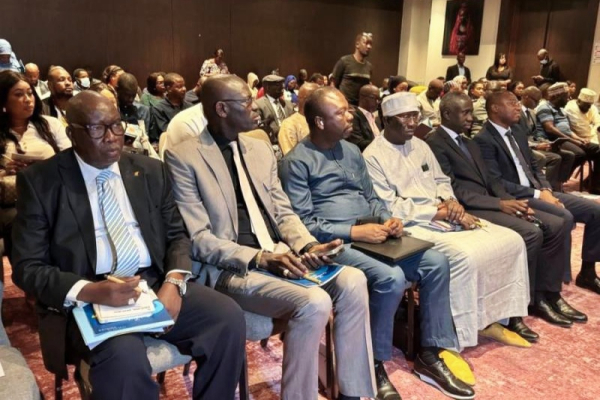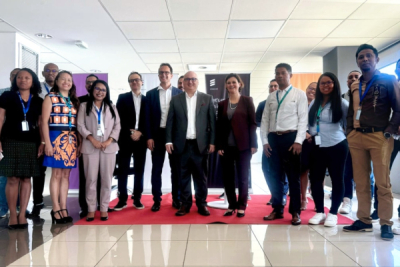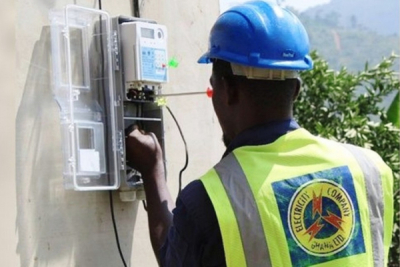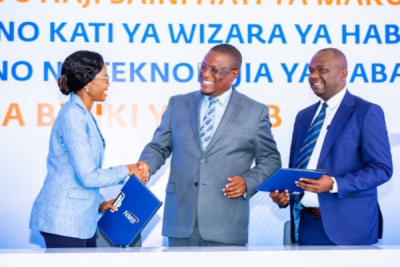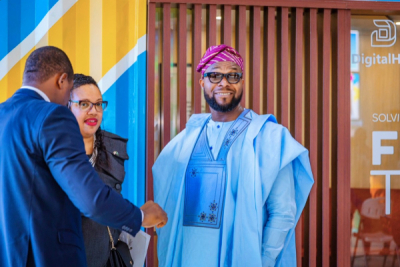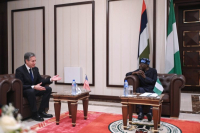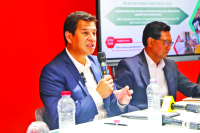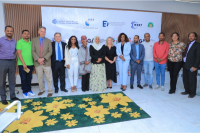
Public Management (482)
Senegal's ongoing drive to digitize administrative services marks a significant milestone as GUDE embarks on its digital transformation journey. This crucial segment of the Senegalese economy, previously undergoing initial digitization efforts, has now entered a key phase that promises to streamline procedures and enhance efficiency.
Starting February 1, Senegal's authorities will expand the Single Dematerialized Collection Desk (GUDE) to all participants in the port sector. The move aims to enhance the Port of Dakar (PAD)'s efficiency, increase the port platform's revenue, and simplify procedures for economic operators.
Makhtar Lakh, Secretary General of the Ministry of Commerce, Consumer Affairs, and Small and Medium-sized Enterprises, stated that the new system for dematerializing collection procedures would save operators time and resources, reduce state and consumer costs, and improve operation predictability.
The GUDE, a collaboration between the PAD, the General Directorate of Customs, and the Community of Port Actors, will extend to other services such as transit, export, and transfers to customs clearance areas outside the PAD over the next three months.
The GUDE's launch is part of Senegal's public sector's ongoing digital transformation. Despite the digital transition's progress, many services are still catching up with the country's public administrations' technological revolution.
Earlier this month, the General Directorate of Public Accounting and the Treasury (DGCPT) introduced an online payment service for road fines. Last November, Senegal Numérique, the national company responsible for managing the State's digital infrastructures, partnered with Blaise Diagne International Airport to digitize all airports in the country.
Adoni Conrad Quenum
Kenya is aiming to become a leading technology hub in Africa, ramping up investment in the sector and forging strategic partnerships to fast-track its ambitions.
Kenyan President William Ruto (photo, right) announced on Saturday, January 27, during the inauguration of the Mukiria Technical Training Institute’s teaching block and engineering workshop in Central Imenti, that China has been chosen to equip the country’s digital hubs. The initiative aims to provide Kenyan youth with digital skills.
Ruto emphasized the importance of investing in technical colleges and ICT hubs to ensure that the youth acquire the necessary competencies to monetize their knowledge and skills, thereby contributing to the country’s economic development.
"Our investment in technical colleges and ICT hubs guarantees our youth the acquisition of competencies to help them monetize their knowledge and skills so that they can contribute meaningfully to our economic development," he said.
The Kenyan government has prioritized digital technology in its development policy, taking steps to enable its population, particularly the youth, to keep up with the global technological revolution. The establishment of various digital hubs is a part of this initiative, and the government has increased the education budget to support this project.
“Technical training is a crucial element of the Kenyan government’s strategy to equip our human capital, especially the youth, with skills that can significantly contribute to the country’s development,” Ruto explained.
Kenya, along with Nigeria, Egypt, and South Africa, boasts one of the most advanced technological ecosystems in Africa. As of early 2023, Kenya had 17.86 million Internet users, representing an Internet penetration rate of 32.7%, according to DataReportal.
Adoni Conrad Quenum
Across Africa, a rapid digital transformation is fueling the continent's economic emergence. Massive investments in technological infrastructure are laying the groundwork for innovation, job creation, and enhanced connectivity, offering a powerful catalyst for growth.
Swedish telecoms giant Ericsson is teaming up with the Malagasy government to accelerate the country's digital transformation, following a recent working visit by its regional leadership.
Strategic meetings with key partners, customers, and industry leaders explored leveraging Ericsson's technologies to expand mobile broadband, bridge the digital divide, and empower individuals, businesses, and communities.
"The engagements focused on Madagascar’s Information and Communications Technology (ICT) landscape and delved into areas of collaboration to leverage Ericsson’s innovation to expand mobile broadband access, drive digital inclusion, and create unlimited opportunities for individuals, empower businesses, and transform communities," an Ericsson release points out.
This initiative is part of Ericsson's #AfricaInMotion vision, aiming to contribute to sustainable development and digitization across the African continent. Ericsson's commitment to Madagascar includes recent collaborations like the 2Africa submarine cable project alongside Vodafone. The company is also intensifying investments in telecom infrastructure across its African markets.
The recent working visit thus reaffirms Ericsson's commitment to supporting Madagascar's digital transformation ambitions, contributing to a more connected and prosperous future for the island nation. According to the company's Mobility Report published in November 2023, mobile subscriptions in sub-Saharan Africa are forecast to grow by 3% annually. The number of subscriptions is expected to rise from 940 million in 2023 to 1.1 billion in 2029, with 5G leading this rapid expansion.
Samira Njoya
Ghana's public utilities are joining a wave of digital transformation sweeping across Africa, aiming to improve efficiency, transparency, and service delivery in vital sectors like water, electricity, and sanitation. The move reflects a broader trend across the continent, where countries are increasingly leveraging technology to modernize infrastructure, boost economic growth, and improve citizens' lives.
Ghana’s state-owned Electricity Company (ECG) announced on Saturday, January 27, the digitization of several of its services. Customers will need to use the company’s mobile app to access services such as requesting a new contract, a sub-meter, or an additional load, to enhance service quality.
The company issued a press release stating, “This paperless system will require prospective customers applying for service to use the ECG Mobile App and follow the prompts therein, including uploading all required documents for the processing of service requests.” It further advised customers to provide accurate information when applying for the service, noting that all responses regarding their applications would be communicated via the contact telephone numbers provided.
Digital transformation is accelerating in Ghana, as in many other African countries, with an increasing number of public bodies digitizing their services to simplify daily life for citizens. According to the “E-Government Survey 2022 The Future of Digital Government” report by the United Nations Department of Economic and Social Affairs (UN DESA), Ghana, under the leadership of Nana Akufo-Addo, is one of sixteen African champions in e-government, outperforming other West African countries like Cape Verde and Côte d’Ivoire.
DataReportal data indicates that Ghana had 23.05 million internet users at the start of 2023, representing an internet penetration rate of 68.2%.
Adoni Conrad Quenum
In a bid to bolster the nation's digital economy, Tanzanian officials have opted to forge strategic alliances.
Minister of Information and Communication Technologies Nape Nnauye (pictured center) signed a memorandum of understanding (MoU) with NMB Bank executives this weekend in Dar es Salaam. "This agreement aligns with our Ten-Year Digital Economy Strategy (2024-2034)," Nnauye emphasized, highlighting the government's commitment to fostering local tech advancement.
The partnership positions NMB Bank as a key player in Tanzania's digital drive. The collaboration will see the bank co-design crucial digital systems alongside public authorities. Examples include the "Jamii Namba" citizen identification platform and the electronic "Know Your Customer" (eKYC) protocol for streamlined online service delivery.
NMB Bank CEO Ruth Zaipuna (pictured left) welcomed the partnership, stating, "Strengthening the digital economy benefits both NMB Bank and the broader financial sector by enabling improved delivery of financial services across the country."
This move aligns with President Samia Suluhu's vision of a thriving digital economy as a vital engine for Tanzania's development. The country's growing online presence is undeniable, with DataReportal data citing 21 million internet users and 4.90 million social media users as of 2023, translating to a 31.6% internet penetration rate.
Adoni Conrad Quenum
Bosun Tijani's tenure as the Digital Minister has seen a surge in programs aligned with national strategy. This new program is dedicated to enhancing the skills of civil servants.
Nigeria's Minister of Communications, Innovation and Digital Economy, Bosun Tijani (photo, right), announced the launch of DevsInGovernment on Friday, January 26, via social media platform X. The initiative aims to enhance the digital skills of civil servants and improve public service delivery.
"To build a digitally empowered Civil Service for Nigeria, we recently launched DevsInGovernment," Tijani wrote. "This community of technologists and tech enthusiasts in public service will collaborate to drive efficiency in the delivery of public services. They will also champion our Digital Public Infrastructure initiative aimed at transforming public services."
This move aligns with Nigeria's national digital transformation strategy. However, despite government investments, the country lacks a strong e-government presence, ranking outside the top 16 performers in Africa, according to the UN DESA's 2022 "E-Government Survey."
“When we empower these people, when we create the community as a platform for Serendipity a lot will happen. They can collaborate, they can share their pains; they can access resources together and we can also focus on supporting them with continuous personal development as well just to ensure that even as we aspire to deeply use technology, we have the workforce to also back them as well," Tijani explained.
Adoni Conrad Quenum
In 2023, funding for African startups fell by 40% compared to 2022 with all African technology ecosystems being affected, especially Nigeria.
U.S. Secretary of State Antony Blinken (photo, left) pledged a strong partnership with Nigeria's burgeoning tech sector during a Tuesday meeting with President Bola Tinubu, expressing American firms' eagerness to invest and collaborate.
Nigeria "is a place of extraordinary innovation and dynamism," Blinken said at the State House in Abuja. "I've seen that each and every time, and I expect to see more of that in Lagos tomorrow."
Blinken's remarks underscore the growing interest from U.S. tech giants and venture capitalists in Nigeria's vibrant startup ecosystem, one of the most promising on the continent. According to CB Insights, Nigerian startups raised $224 million in 2023 alone, following a $531 million haul in 2022 and exceeding $1 billion in 2021.
"American entrepreneurs and companies are eager to partner with and invest in Nigeria's economy, particularly in the tech sector," Blinken emphasized. "Our venture capital companies are working to finance them. We want to work in partnership to help drive Nigeria's technological revolution."
He further highlighted the potential for mutual benefit, stating: "One of the things we've learned from these partnerships is that it benefits us as much as any place or any company that we're investing in."
Adoni Conrad Quenum
As the rapid digital transformation exposes users to cyber threats across Africa, authorities are taking steps to secure the cyberspace, recognizing the crucial role of cybersecurity in fostering sustainable development.
Benin’s parliament on Tuesday approved a law for the ratification of the Malabo Convention on cybersecurity and personal data protection. This move empowers the Beninese government to effectively tackle cybercrime.
The Malabo Convention, aimed at bolstering and harmonizing the ICT legislation of African nations and Regional Economic Communities, became crucial in the wake of the COVID-19 pandemic, which spurred digital transformation across the continent. The convention, which respects fundamental freedoms and human rights, came into effect last October after ratification by Mauritania.
With this ratification, Benin joins 15 other African states that have ratified the convention since its adoption in 2014 in Equatorial Guinea. It will therefore enable the enforcement of that convention as per its Article 36, which requires ratification by at least 15 countries before that implementation. The countries that ratified it before Benin include Angola, Togo, Senegal, Rwanda, Namibia, Niger, Mauritius, Mozambique, Ghana, Zambia, the Democratic Republic of Congo, Cape Verde, Guinea, Côte d’Ivoire, and Mauritania.
Benin’s parliamentarians also ratified the Budapest Convention on Cybercrime, providing an international framework for practitioners in the States Parties to collaborate and establish relations for cooperation in specific cases, especially emergencies, beyond the specific provisions of the Convention.
Adoni Conrad Quenum
Faced with cumbersome identification procedures and fragmented data, Madagascar is embarking on digital identification. The initiative is aimed at streamlining services, bolstering transparency, and optimizing data management.
Madagascar's Ministry of Digital Development, Digital Transformation, Posts and Telecommunications (MNDPT) announced on Friday, January 19, the imminent launch of a digital national identity card project for citizens aged 15 and above. Minister Tahina Razafindramalo (photo, left) told journalists at a press conference that production is set to begin as early as June in several regions.
"This marks a significant step for Madagascar as it embarks on modernizing its identity management system, similar to recent efforts in countries like Tunisia and Greece," remarked Razafindramalo.
The project, financed to the tune of $140 million by the World Bank, encompasses biometric enrolment, data collection, digital infrastructure development, and card production. It aligns with the Malagasy government's Digital Strategic Plan 2023-2028, seeking to streamline administration and centralize data for efficient population registration and census.
UNICEF estimates that roughly 2.5 million children under 18 and 1 million adults currently lack official identification in Madagascar, often due to bureaucratic hurdles or administrative deficiencies. These challenges leave them "administratively invisible," hindering access to essential services and rights.
The implementation of the digital national identity card project is set to revolutionize the way citizens interact with the government and access essential services. The project will provide each target citizen with a unique identifier and biometric ID card, preventing duplicate identity.
Samira Njoya
An increasing number of African nations are looking to leverage the technology ecosystem to enhance their digital economy. Governments are partnering with diverse organizations to provide a plethora of opportunities for local tech innovators.
Global Innovation Initiative Group (GIIG), a Mauritius-based tech platform, announced a strategic partnership Friday with Ethiopia's Ministry of Innovation and Technology, Ministry of Labor and Skills, and Entrepreneurship Development Institute (EDI) to propel the nation's burgeoning startup scene.
"EDI and GIIG have a shared purpose to discover, iterate and scale solutions that deliver impact for some of the world’s most stubborn challenges with a mission to create a vibrant, resilient, and authentically Ethiopian entrepreneurial innovation ecosystem. As partners, we can lead with a greater sense of urgency, to help communities and organizations adopt change faster for rapid transformation," said Hassan Hussein, EDI President and CEO.
The collaboration comes after Addis Ababa hosted the African leg of the Global Startup Awards in October 2023. The event, covering 120 countries (54 in Africa), catalyzed Ethiopia's ambition to build local innovation economies, equip its citizens with future-fit skills, and nurture globally competitive businesses.
This move reinforces Ethiopia's efforts, including the Next Ethiopian Startup Initiative (NEST) launched last October, to prioritize and develop its startup ecosystem.
"As part of the NEST initiative, we are committed to building a long-term partnership with GIIG and the Global Startup Awards Africa," said Muferihat Kamil, Ethiopia's Minister of Labor and Skills. "It is absolutely critical that the startup ecosystem in Ethiopia becomes a leading agenda for the nation. We need to build our economies not to imitate but to lead as Africans and initiatives with GIIG will play a significant role in enabling this."
However, Ethiopia faces challenges in its quest for digital transformation. Recent years have seen concerns regarding voluntary internet shutdowns amidst regional conflict and public protests. According to Top10VPN, Addis Ababa alone experienced 14,910 hours of internet blackout in 2023, costing an estimated $1.59 billion. In 2019, the country experienced 346 hours of blackouts, affecting 19.5 million inhabitants and costing the country $56.8 million.
Adoni Conrad Quenum
More...
Last December, William Ruto paid a three-day visit to India. Several partnerships were forged between the two countries, including one in the technology sector.
The Indian government has approved a Memorandum of Understanding (MoU) with Kenya, aimed at sharing digital solutions for large-scale digital transformation, according to a statement released on Thursday. The MoU, which was signed on December 5, will be effective for three years from the date of signature.
The agreement seeks to foster closer cooperation and exchange of digital technology-based experiences and solutions to drive digital transformation initiatives in both nations.
Kenyan President William Ruto (photo, left), who visited India in December, signed several MoUs, including the one approved, with the Indian government led by Prime Minister Narendra Modi (photo, right). Ruto is keen on leveraging the digital sector as the driving force of Kenya's economy and is actively seeking partnerships to this end.
Kenya, with its mature technological ecosystem, is a major attraction for investors on the continent. A report by CB Insights, published last January 4, projected that Kenyan start-ups would have raised approximately $228 million by 2023.
It's worth noting that several African nations, including Sierra Leone, Gabon, Mauritius, and Nigeria, have sought India's technological expertise and have entered into partnerships with the country.
Adoni Conrad Quenum
Morocco has stepped up efforts to modernize its government services through digitalization, launching several initiatives aimed at increasing service efficiency and promoting citizen participation through online channels.
Morocco has digitized over 600 public services, with a focus on improving access for citizens and businesses, Digital Transition and Administrative Reform Minister Ghita Mezzour (photo) announced on Monday.
Of the digitized services, 300 are dedicated to citizens, 200 to businesses, and 100 to public administrations, Mezzour told the House of Representatives. She emphasized the government's commitment to completing ongoing digital projects encompassing public service management, administrative reform, online content regulation, and support for emerging businesses, all part of the national digital strategy.
Morocco's new digital strategy, "Maroc Digital 2030," currently undergoing approval, is built on two pillars: complete digitization of public services and stimulating the digital economy. It aims to create 300,000 jobs and contribute $17 billion (170 billion dirhams) to GDP by 2030.
To achieve these goals, the strategy proposes a range of initiatives, including labeling 3,000 startups, a significant increase from the 380 registered in 2022 ; qualifying 45,000 digital talents annually ; retraining 50,000 young people in digital professions and attracting 6,000 foreign digital talents each year.
With full service digitization, Morocco aims to climb from its current 113th position to the top 50 in the UN e-governance rankings. The country aspires to be a major player in the digital economy, driving job creation, economic growth, and improving citizens' lives through accessible and innovative public services.
Samira Njoya
While the digital economy booms elsewhere, the Central African Republic (CAR) faces a persistent challenge in bridging its own digital divide. Yet, amidst ongoing national struggles, the government is actively taking steps to equip young people with the digital skills they need to thrive in the global job market.
In a significant push towards a digital future, President Faustin Archange Touadéra of the Central African Republic (CAR) inaugurated a state-of-the-art digital training center and incubator at the University of Bangui on Monday, January 15. This launch coincided with the official nationwide rollout of broadband internet for the first time in the country.
Financed jointly by the European Union and the African Development Bank (ADB), the center aims to equip young people with the skills and tools to drive the creation of jobs and economic diversification through the burgeoning digital sector.
"This center marks a new chapter for fiber optic development in the Central African Republic. Its completion paves the way for high-speed internet access and positions CAR to become a smart nation, recognizing that internet access is a cornerstone of national development," stated the Prime Minister’s office.
The initiative forms part of CAR's national fiber optic backbone project, a key component of the broader Central African Backbone (CAB) program. Alongside the training center, the project encompasses a cybersecurity and electronic certification platform as well as technical assistance for the Ministry of Digital Economy, Posts and Telecommunications in establishing the Central African Digital Development Agency, which will spearhead the nation's digital strategy implementation.
The new center boasts cutting-edge equipment, including a training room, technical facilities, offices, an incubator, a database processing lab, and more. This infrastructure will empower young Central Africans to design, develop, and market digital products addressing the population's needs.
Samira Njoya
Algeria's digital transformation gained momentum in 2023, with the government implementing several programs. For the new year, the country prioritizes e-governance initiatives.
Algeria's state-run Haut-Commissariat à la Numérisation (HCN), the agency leading the nation's digital transformation, signed a memorandum of understanding (MoU) with Huawei Telecommunications' Algerian subsidiary on January 10.
The agreement, signed by HCN High Commissioner Meriem Benmouloud and Huawei Algeria's Chairman and CEO Eason Yi, aims to boost cooperation in key areas including experience exchange, training, and skills development as well as strategic support.
It sets the stage for collaborative knowledge sharing and best practices in the field of digital transformation while providing the framework for both parties to focus on equipping Algerian professionals with the necessary skills to drive the country's digital agenda. Also, in its framework, Huawei will contribute its expertise to the development of Algeria's 2024-2029 national digital transformation strategy, currently spearheaded by the HCN.
This partnership aligns with the HCN's mission of overseeing and guiding Algeria's digital transition. Established just months ago, the agency is tasked with managing strategic projects like the upcoming draft bill on digitization, slated for completion in the first quarter of 2024.
Samira Njoya


